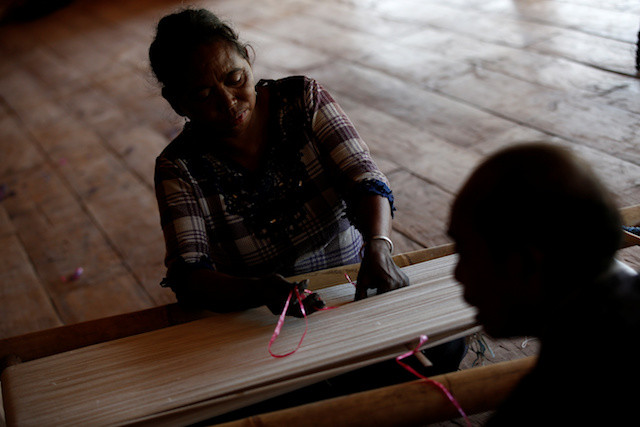Popular Reads
Top Results
Can't find what you're looking for?
View all search resultsPopular Reads
Top Results
Can't find what you're looking for?
View all search resultsAs crops fail, Indonesia's Sumba seeks lifeline in weaving, fishing
Change text size
Gift Premium Articles
to Anyone
 Maria Babang Noti, 51, and her husband Thomas Tay Ranjawali, 52, prepare to hand weave a traditional Sumba Ikat textile at Atma La Kanatang, their weaving house in Hamba Praing village, Kanatang district, East Sumba Regency, East Nusa Tenggara province, Indonesia, Feb. 23, 2020.But in the village of Hamba Praing in East Sumba, scores of horses and cattle have died in recent years as extreme drought withered the grass, leaving behind bones and carcasses scattered over the scrubby landscape. (Reuters/Willy Kurniawan)
Maria Babang Noti, 51, and her husband Thomas Tay Ranjawali, 52, prepare to hand weave a traditional Sumba Ikat textile at Atma La Kanatang, their weaving house in Hamba Praing village, Kanatang district, East Sumba Regency, East Nusa Tenggara province, Indonesia, Feb. 23, 2020.But in the village of Hamba Praing in East Sumba, scores of horses and cattle have died in recent years as extreme drought withered the grass, leaving behind bones and carcasses scattered over the scrubby landscape. (Reuters/Willy Kurniawan)
O
n Indonesia's Sumba island, the motifs displayed on traditional textiles produced by its weavers often depict animals, including the area's famed Sandalwood breed of horses.
But in the village of Hamba Praing in East Sumba, scores of horses and cattle have died in recent years as extreme drought withered the grass, leaving behind bones and carcasses scattered over the scrubby landscape.
East Sumba, about 2,000 km east of Jakarta, last year reportedly had 249 days in a row without rain, with some experts blaming climate change for more frequent drought-inducing weather patterns, forcing people to adapt to survive.
"Nowadays, we no longer plant things," said local farmer Thomas Tay Ranjawali, 52, referring to the peanut and corn crops typically grown by villagers.
As well as trying to keep his animals alive, the father of six is now learning how to weave, a practice normally reserved for woman, to get extra funds for food.
Sumba is in Indonesia's third poorest province of East Nusa Tenggara, which is also the driest region of the archipelago.
Indonesia's meteorology agency said conditions were being made more extreme by the strongest Indian Ocean Dipole - the difference in sea temperatures across the ocean - in a century that can cause drier weather in Southeast Asia and Australia.
"The increase of temperatures in Indonesia is proof of global warming," said agency official Supari, who uses one name, noting Sumba was one of the most vulnerable areas.
As the drought ravages the village, Ranjawali and his wife, Maria Babang Noti, are forgoing seeds to buy more yarn for the lengthy process of weaving intricate Sumba Ikat textile.
Another farmer, Ndelu Ndaha, 49, is now spending more time trying to catch fish.
Eighteen of his horses and seven cows recently died, and to keep the remaining animals alive grass had to be brought in from other villages.
"The horses easily get ill. They don't have anything in their stomach. Every year, there are always deaths," said Ndaha.









